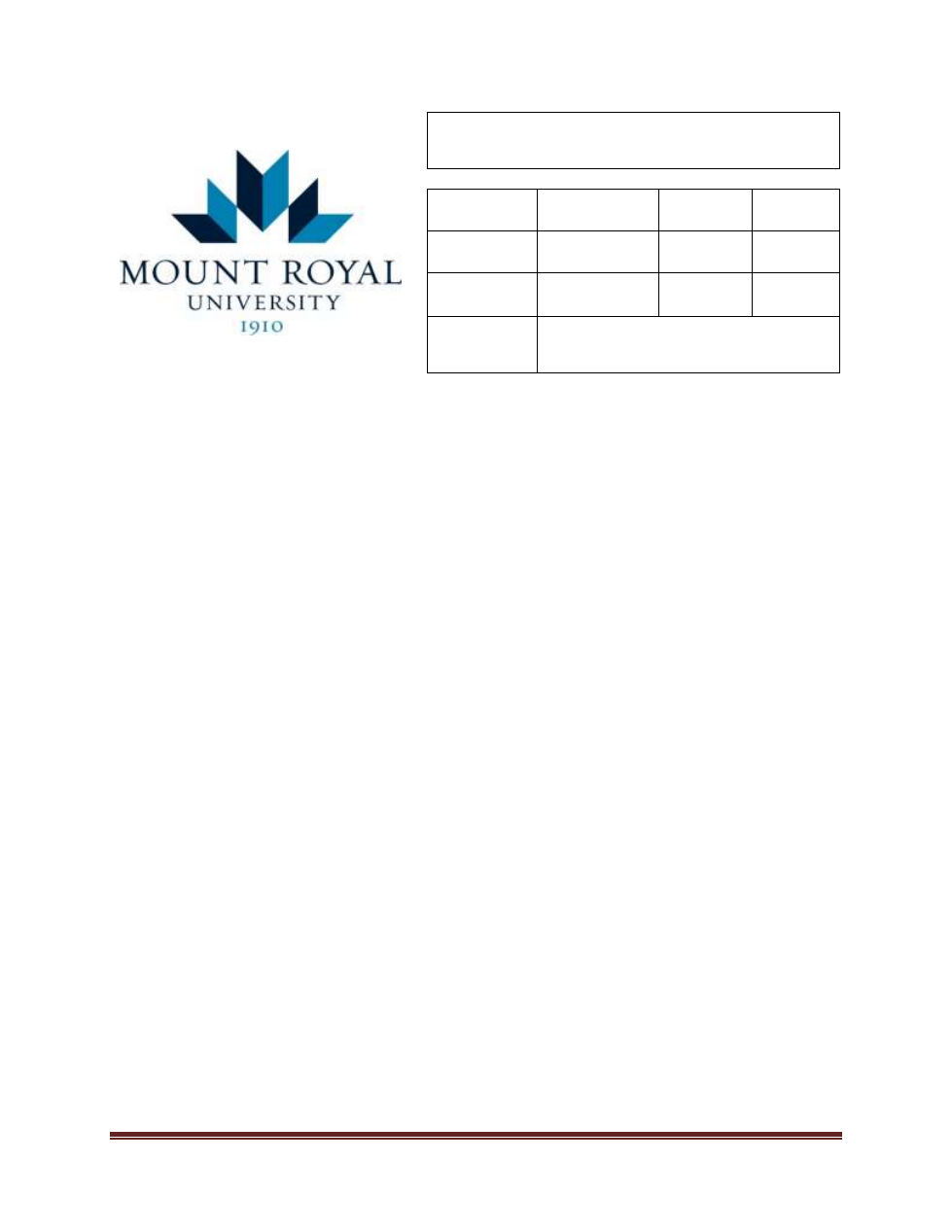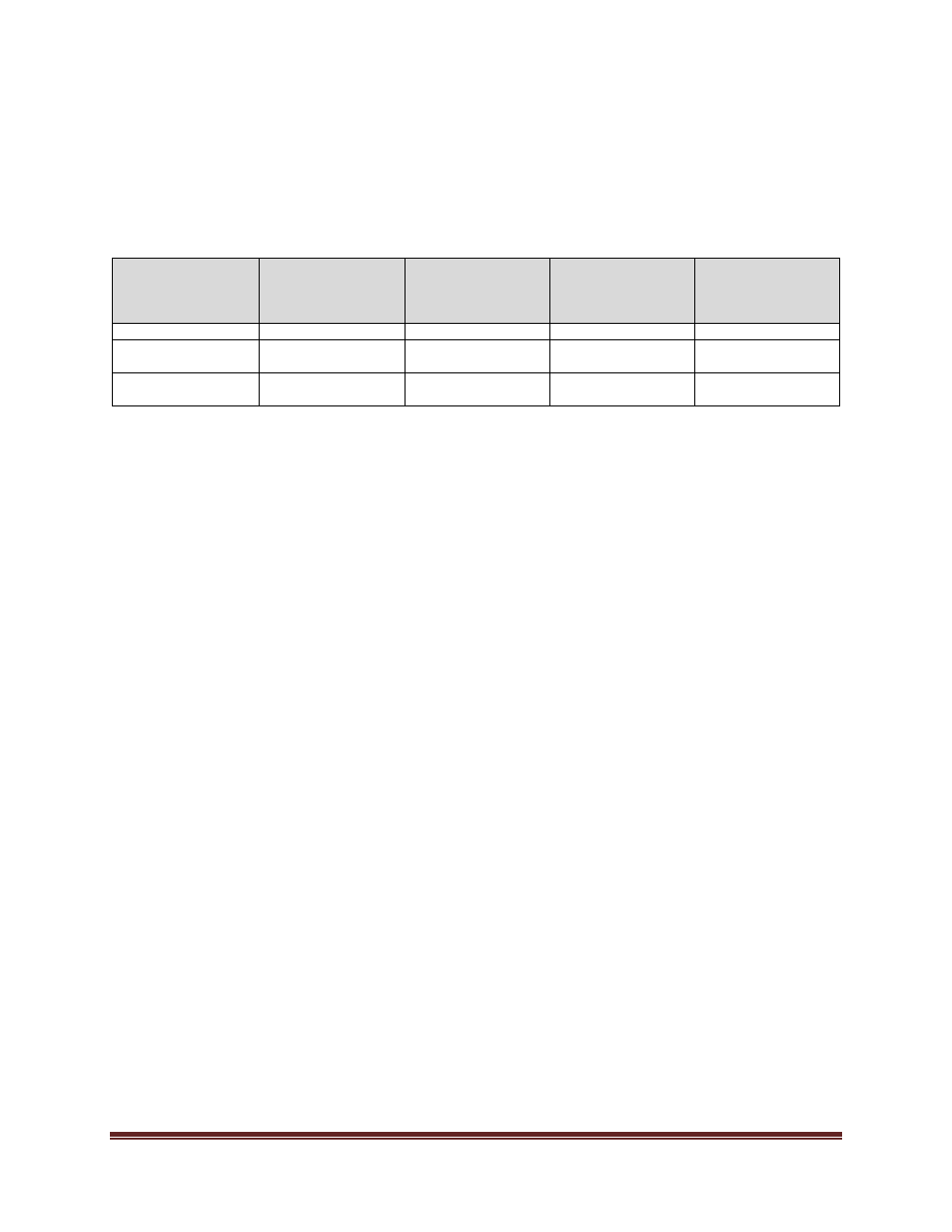
Internal Control Environment, Cash and Payment Handling Procedures – April 7, 2008
Page 1 of 7
INTERNAL CONTROL ENVIRONMENT, CASH
AND PAYMENT HANDLING PROCEDURES
Procedure
Type:
Management
Initially
Approved:
April 7, 2008
Procedure
Sponsor:
VP, Finance &
Administration
Last
Revised:
April 7, 2008
Administrative
Responsibility:
AVP, Finance &
Commercial
Operations
Review
Scheduled:
May 2025
Approver:
Executive Leadership Team
A.
PROCEDURES
These procedures derive from the Cash and Payments Handling Policy as approved by the Board
of Governors. Throughout these procedures, Cash and payment in all forms will be referred to as
“Cash.”
The handling of payments for petty cash reimbursements falls outside these procedures although
the safeguarding of that Cash within the Organizational Units’ work areas is applicable. For
information specifically on petty cash, see Petty Cash and Cash Floats Procedures.
Key departmental activities to ensuring a comprehensive internal control environment in Cash
handling include:
1) Safeguarding of Cash;
2) Collection of processing of Cash and related information
3) Issuing refunds;
4) Over/short procedures
5) Initiation or revision of departmental Cash handling processes and systems;
6) Notification where fraud is suspected;
7) Notification of security concerns;
8) Maintenance of Cash records; and
9) Regulatory compliance.
1.
SAFEGUARDING OF CASH
1.1
Physical Security Over Cash
a. Cash must never be left unattended and unsecured.
b. Restrict access to Cash to authorized individuals with specific responsibility for
its handling.
c. Secure Cash immediately upon receipt in the method provided for the given
activity and venue.
d. Cash drawers/registers/boxes/safes containing Cash must be closed when not
in use and locked when unattended.

Internal Control Environment, Cash and Payment Handling Procedures – April 7, 2008
Page 2 of 7
e. Organizational Units, where daily cash drawers/registers/boxes contain large
sums of Cash, must determine the maximum amount of Cash to be held and
develop a drop procedure to secure the excessive funds.
f. Record, in a timely manner, all Cash received and the activity to which it relates,
including the reconciled deposit or remittance form, and any information required
to recover payments in the event of a loss.
g. Cash should be deposited daily subject to adequate temporary security in the
Organizational Unit, and as a general rule any amount in excess of $200 should
be deposited daily. Funds must not be held longer than three (3) business days.
h. Where there is no independent sales register, point of sale system or metering
device, two authorized people must collect, account for and secure the Cash.
i. Each Organizational Unit must develop, document and provide training on their
specific procedures to be followed in the event of a threat, emergency or
evacuation incident. Cash is to be secured whenever possible, even in these
circumstances, but not at the expense of safety of personnel involved.
1.2
Custody of Keys and Combinations
a. The number of individuals with access to keys and/or knowledge of the
combination for the safe must be restricted to no more than is necessary to
ensure consistent operational requirements.
b. For emergencies or in the absence of the fund custodian, copies of combinations
and/or keys must be secured and stored by the department head or designate.
c. Where Cash and payment receipts are held after hours, they must be stored in
a locked cash register, cash box or safe. Keys must never be stored in an
unlocked desk drawer or unsupervised area.
d. Safe combinations must be changed periodically. The need to change
combination codes must be assessed annually for risk exposure. As well, unless
the risk is deemed negligible, the combination must be changed in every event
of employee turnover or reassignment of duties.
e. In the event of a cash box or safe key being lost or unaccounted for, the key or
cash box must be changed.
f. Management is responsible to ensure that the safe or Cash security method for
the Organizational Unit is appropriate and adequate.
2.
COLLECTION AND PROCESSING OF CASH AND RELATED INFORMATION
2.1
Where Cash is received, frequently and directly from customers, a cash register or
computerized system with automatic receipt generation must be used. For
establishment of such a system, the Department of Finance and Risk Management
must be contacted.
2.2
Organizational Units must:
a. Establish written procedures for receiving Cash. It is best practice that
individuals who control and reconcile these payments are
not the same

Internal Control Environment, Cash and Payment Handling Procedures – April 7, 2008
Page 3 of 7
individuals receiving and preparing them for deposit. Where this is not practical,
mitigating controls must be defined, documented and employed by the
Organizational Unit.
b. Deposit their Cash received either to the Finance Cashier or if previously
authorized, through direct deposit to the prescribed bank account.
c. Appropriately record and reconcile their Cash for transfer to the Department of
Finance and Commercial Operations or the bank. The form of this record must
be in accordance with the Cash and Payment Handling Policy and these
procedures and must be documented within the departmental procedure.
i.
Preparation, Reconciliation and Approval
•
Reconciliation involves comparing information from two or more
sources and independently verifying the work that has been
completed by others. The reconciliation processes may vary by
Organizational Unit but must be documented within the area’s
procedures for the reference of those completing the reconciliation.
•
Critical parameters include balancing daily Cash collections to the
point of sale system, Mount Royal Financial System (Banner) or
both where applicable.
•
Consideration of float allotments and their treatment in the
reconciliation process must be included. The float balance must be
recognized and remain unchanged.
•
In the event of a Cash over/short in reconciliation, this should be
investigated but must not hold up the transfer and deposit of Cash.
See Over/Short procedure in this document.
•
The final step of any reconciliation is the timely review and approval
of the reconciliation by the appropriate Supervisor within the
Organizational Unit.
ii.
Bank Deposits
•
Mount Royal funds must be deposited into a Mount Royal bank
account authorized by the Board of Governors.
•
The full amount of Cash received must be deposited directly into the
appropriate bank account using Mount Royal provided Bank Deposit
forms and secure deposit bags. Cash received for payment of
goods or services in an Organizational Unit must not be used for any
unauthorized purposes, including but not limited to, personal loans,
cashing of cheques, petty cash, making purchases, or for salaries,
wages or honoraria.
•
Cash transferred directly to the bank, must be supported by timely
transfer of deposit information to the Department of Finance and
Commercial Operations.

Internal Control Environment, Cash and Payment Handling Procedures – April 7, 2008
Page 4 of 7
iii.
Transfer of Cash to Finance Cashier
•
Cash transferred to the Finance Cashier must be accompanied by
a completed Cash Remittance Form and/or a completed bank
deposit:
1) When delivering during regular cashiering hours, the deposit will
be signed off by the cashier as acknowledgement of receipt of
the package.
2) When outside the regular cashiering hours, the deposit drop box
should be used.
3) Best practice is to have a second verification and signature
indicating the same on deposit totals.
iv.
Movement of Cash on Campus and Between Mount Royal Sites
•
Organizational Units accepting Cash must securely transport their
deposits to their appropriate destination.
•
Where Cash deposits are brought to the Department of Security
Services for safekeeping, it is the responsibility of the Organizational
Unit to log and track what is being held at Security Services upon
drop off, as well as to retrieve from Security Services those deposits
for further handling. During the time that Security Services is in
possession of the deposit, it is their responsibility to ensure its
safekeeping as per the Cash and Payment Handling Policy and
these procedures.
•
Mount Royal security personnel are available to accompany
depositors and deposit bags to their appropriate destination. For
deposit values exceeding $500, it is recommended that a Security
Services employee accompany the depositor. It is recommended
that when Organizational Units are delivering deposit bags, it be
done at random times rather than a consistent time of day.
•
Cash must never be sent by internal mail. As well, in the case of
satellite operations, Cash must not be sent by external mail.
•
Where an Organizational Unit routinely conducts activities
generating Cash off the main campus, use of the armored car
services is encouraged for delivery of such Cash proceeds. All
armored car services must be arranged through the Department of
Finance and Commercial Operations. Where the armored car
service is deemed impractical, a specific procedure for handling the
Cash must be defined, documented and employed.
3.
ISSUING REFUNDS
3.1
Internal control standards for the issue of refunds include:
a. Refunds must be issued only by those authorized as per the Organizational
Unit’s documented procedures.

Internal Control Environment, Cash and Payment Handling Procedures – April 7, 2008
Page 5 of 7
b. Refunds must be issued by an employee only up to a predetermined value
appropriate to the Operational Unit; Supervisor authorization is required above
that value.
c. Refunds require an explanation either through a signed document or a
description in a computerized entry.
d. Cheque payments must not be refunded until processed by the bank ensuring
the original funds have been received.
e. Refunds must be processed by the same method as the original payment except:
i.
where Organizational Unit procedures restrict refunds by Cash.
ii.
Debit card must be refunded by cheque unless the debit cardholder is
present and identify proven
iii.
When original payment is no longer valid, Organizational Unit
procedures must be used to determine the most appropriate method of
refund.
4.
OVER/SHORT PROCEDURES
4.1
Shortfalls or overages of Cash compared to register report balances must be
reported in a Department Cash Balancing Report.
4.2
Each operating area must have a documented procedure to monitor the incidents
and magnitude of Cash overages and shortages and must address any significant
incidents or patterns.
4.3
In the event of a significant Cash overage or shortage, the department head must be
notified. A record of such significant discrepancies must be maintained by the
department.
5.
INITIATION OR REVISION TO DEPARTMENTAL CASH HANDLING PROCESS AND
SYSTEMS
Where an Organizational Unit requires establishment of a new system for collecting Cash
receipts or plans to receive a substantial amount of Cash receipts related to new activity, the
department must contact their Mount Royal Department of Finance and Commercial
Operations business analyst who will assess requirements and involve the Finance Revenue
and Treasury Coordinator for assistance, as necessary.
6.
NOTIFICATION WHERE FRAUD IS SUSPECTED
Where an employee has concerns about the possible misappropriation of Cash receipts,
inventory or other Mount Royal assets, the employee should consult the Protected Disclosure
(“Whistleblower”) Policy.
7.
NOTIFICATION OF SECURITY CONCERNS
At any time when an ongoing threat to Mount Royal resources or personnel is a reasonable
possibility, Mount Royal Security Services must also be contacted to determine the most
appropriate action to be take.

Internal Control Environment, Cash and Payment Handling Procedures – April 7, 2008
Page 6 of 7
8.
MAINTENANCE OF CASH RECORDS
Source documents must be kept in accordance with the Records Retention and Disposal
Schedule for Mount Royal University. Departmental procedures must specify whether
original source documents are sent to the Department of Finance and Commercial
Operations for retention and management or maintained internally within a secured
departmental filing system.
9.
REGULATORY COMPLIANCE
9.1
As methods of payment evolve, regulatory requirements change in accordance with
those developments.
a. The Department of Finance and Commercial Operations is responsible to remain
current with regulatory development and requirements and, where applicable,
communicate to the Organizational Units so that assessments of the operational
impacts can be completed to ensure compliance is maintained.
b. Where Organizational Units accept credit and debit card payment, those areas
must ensure compliance with the current regulations of the Payment Card
Industry (PCI).
B.
DEFINITIONS
(1)
Cash:
refers to all authorized methods of payment acceptable to
Mount Royal. This includes cash (bank notes and coin),
electronic transfers, personal cheques, traveler's cheques,
bank drafts, money orders, gift certificates and credit and debit
cards.
(2)
Organizational Unit: a department, faculty, institute, or centre of ongoing
operational activity generally involving both staff and
budgetary resources, with an Associate Vice-President, Dean,
Director, Manager, Coordinator or Supervisor responsible for
that unit
(3)
Policy:
means the Cash and Payments Handling Policy
(4)
University:
means Mount Royal University
C.
RELATED POLICIES
•
Cash and Payments Handling Policy
•
Protected Disclosure (“Whistleblower”) Policy
D.
RELATED LEGISLATION

Internal Control Environment, Cash and Payment Handling Procedures – April 7, 2008
Page 7 of 7
E.
RELATED DOCUMENTS
•
Petty Cash and Cash Floats Procedures
•
Records Retention and Disposal Schedule, Mount Royal University
F.
REVISION HISTORY
Date
(mm/dd/yyyy)
Description of
Change
Sections
Person who
Entered Revision
(Position Title)
Person who
Authorized
Revision
(Position Title)
04/07/2008
NEW
08/31/2017
Reformatted;
name/title changes
University Secretary
02/21/2021
Editorial
Tile and policy
reference updates
University Secretary University Secretary






